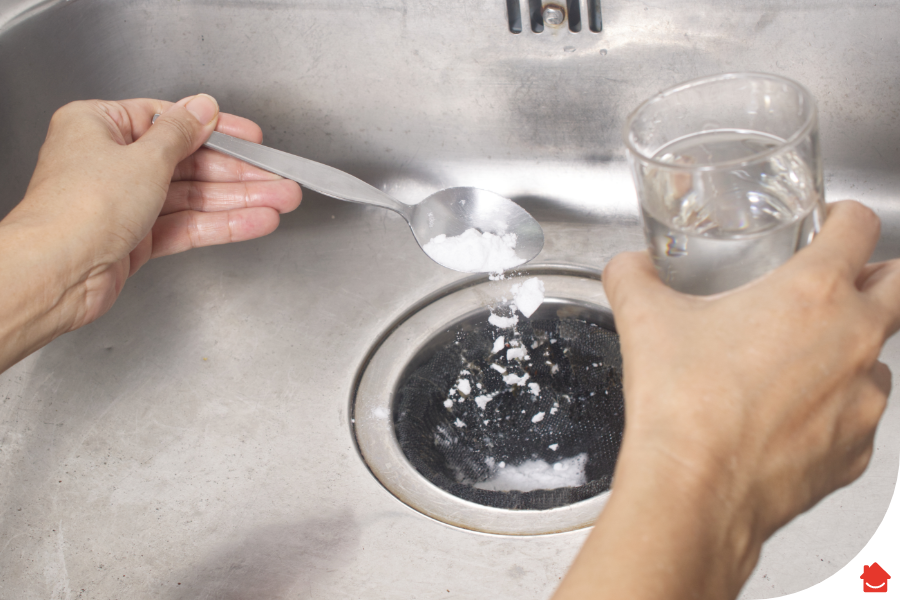Plumbing advice
How to clean smelly drains
29 Apr 2021 • 8 minutes


Smelly scents coming from drains in your home are quite a common issue, and unfortunately, it is usually the first sign that something is wrong with your drainage. While a pipe from the outside may appear clean, a pungent smell coming from within can indicate a problem somewhere inside the pipework. To combat this, we’ve put together a guide to help tackle your odious plumbing.
Sadly, drains don’t just cause horrible smells in one room of the house, but whiffs often are carried from room to room – leaving you with an embarrassing scent that you can’t escape. It can be a source of great annoyance and embarrassment in your life – but what causes the unpleasant problem of smelly drains? The honest answer is, there’s not just one thing to blame for blocked smelly drains, so we’re going to take a look into the most common…
Let’s be honest, we’re all guilty of washing our leftovers down the drain when in reality, they should have been recycled responsibly. However, trapped food is one of the most common causes of a smelly drain and can be the reason your pipes become clogged or run slower. Even if you ensure food doesn’t wash down the drain, scraps of food and other organic materials can slip by. The fragments of these materials may not be entirely washed away and may decompose within the piping, causing nasty odours.
The simple solution to this issue is to fill the sink with hot water and bleach, then drain the water through the pipes. This will help dislodge stuck food and other debris, allowing them to wash away. Alternatively, a baking soda and vinegar combination can work wonders for those looking for a more natural solution.
Another typical cause of smelly drains is partial blockages. Partial clogging is caused by non-decomposable products being washed down the drain, obstructing the normal function of the pipes. This partial blockage causes waste to accumulate within it and become a source of an offensive smell.
If you can smell a sewage scent from your drains, you may have an empty P-trap. This nasty smell is typically found in kitchens and bathrooms when sinks aren’t used very often.
The simple solution to this whiffy problem is to use your sink more. Constant use of your sink will stop the P-trap from emptying, making it harder for pungent odours to rise.
Missing traps or vents, leaks, and even rotting drain tubes can cause inescapable odours that sweep through your home. Making sure your plumbing is watertight is essential to banishing those horrid smells.
As a rule, dishwasher odours are caused by a build-up of trapped food particles or grease. They can block the filters, spray arms, drains and other nooks and crannies of your dishwasher.
If allowed to build up over time, these food scraps begin to smell and let off fishy or funky aromas, which can transfer onto your dishes. Bacteria can also build up, causing your dishwasher to become a breeding ground for germs and mildew.
If your dishwasher smells musty or damp, you may have an issue with a kinked hose or blocked drain. If possible, switch off and unplug the appliance – then try pulling your dishwasher out of its cavity slowly. Inspect the hose for damage and the surrounding areas of water.
For more tips about preventing nasty dishwasher smells, check out our article on how to clean a dishwasher.
If you venture into the garden or near a drain cover outside your home and notice a sewage smell – then the problem might need a little more than a swill of bleach!
Once the issue has left the internal pipes of your home, the possible cause of the smell becomes much harder to pin down. Sadly, DIY solutions probably won’t get the job done. Even if your drain is blocked somewhere along the line, chances are it will need high-pressure jetting to remove.
The pipe could also be damaged or collapsed, leaving an obstruction and backup that could be creating a sewage smell around your home.
For problems outside your home, our blocked outside drain guide could be helpful. However, we’d advise seeking professional help if in doubt. Contacting a drainage engineer to perform an inspection on your drains is a great way to put your mind at ease. Additionally, opting for plumbing and drainage cover could help you combat any nasty surprises later down the road.
From brushing your teeth and shaving to skin routines and hair treatments, your bathroom sink sees a lot of action. So it’s no surprise that it can kick up a stink every now and again.
There are plenty of reasons your bathroom sink might be letting off an odour – these include; hair blockages, build-ups of grease and oils, partial blockages, and even faulty pipework.
Typically, bathroom sink musks can be combated with at-home treatments, such as vinegar and baking soda solutions, pouring bleach down the drain or even unclogging U-bends with a drain snake. However, if you find that an empty drain trap or leak is causing the problem, you might need to call an expert plumber to come and sort things out.
Cleanliness is next to godliness, and nowhere is this more apparent than when it comes to your drains. Making sure to regularly scrub your pipes of any bacteria or debris is important for the health of your drainage system. Knowing how to clean a pongy drain is a must when fixing the problem and preventing further relapses in unpleasant smells.
Before you start frantically scrubbing, it is essential to clear the drain opening of all waste – including any food, hair or soap scum. This will allow you to clean the drain effectively and prevent anything else from being washed down the pipe that isn’t supposed to be.
To begin, carefully pour boiling water down the drain. Wait five minutes, then follow up with cold water to flush away any remaining grease. It’s a fantastic idea to maintain the health of your drain by washing it out with boiling water at the end of each day. Rinsing your drain is an effective technique as it keeps your system running smoothly and prevents material from building up.
Baking soda is an ever-popular cleaning method as it reacts with boiling water and kills most odours. Sprinkle a teaspoon of baking soda down the plughole of your troubled drain and follow it up with boiling water – remember to take care while you pour. This will allow the baking soda to do all the work. Keep pouring the water steadily for 15 seconds.
If all else fails, we’d recommend purchasing a more powerful cleaning solution. There is a range of cleaning products that are made to tackle drainage problems – corrosive drain cleaners are especially effective for blockages and are available in most supermarkets these days.
Kitchen drain odours are some of the most common smells you’ll encounter in your home. From grease and food residue to sink blockages and pipe issues, the range of kitchen drain smells is wide and varied. However, there are a handful of handy tips to clean smelly kitchen drains.
We all love a home remedy when it comes to drainage issues. Let’s be honest, no one wants to fork out unnecessary money on a drainage expert if possible. Thankfully, boiling water, white vinegar and baking soda solutions can all provide an easy answer to your smelly kitchen sink. For the lowdown on how to utilise these home remedies, check out our article on how to get rid of kitchen sink smells.
Your U-bend pipe under your kitchen sink is also known as a sewer gas tap. This U-bend should always be full of water and acts as a preventive measure to stop sewer gas from escaping from the plughole.
Has the water in the U-bend evaporated? This often happens if you’ve been on holiday or have not run your water for a while. The simple answer is to run some water to fill up the U-bend.
Is there a leak in the U-bend? Check for drips and drops under the sink. If there is a leak, call a professional plumber to fix it for you.
Is there an obstruction in the U-bend? If there’s still a blockage after cleaning, remove the U-bend with a wrench and clean it out with a wire brush. You can find the full guide on how to unblock a kitchen sink here.
If you’ve tried everything to get rid of the smell coming from the drains in your home and nothing is working, it might be time to call in a professional. Keep your home protected from smelly drains with HomeServe’s plumbing and drainage cover for peace of mind when it comes to your plumbing and drainage problems.

Our help & advice articles cover Plumbing, Home heating, Electrical, Energy-saving and Home maintenance.